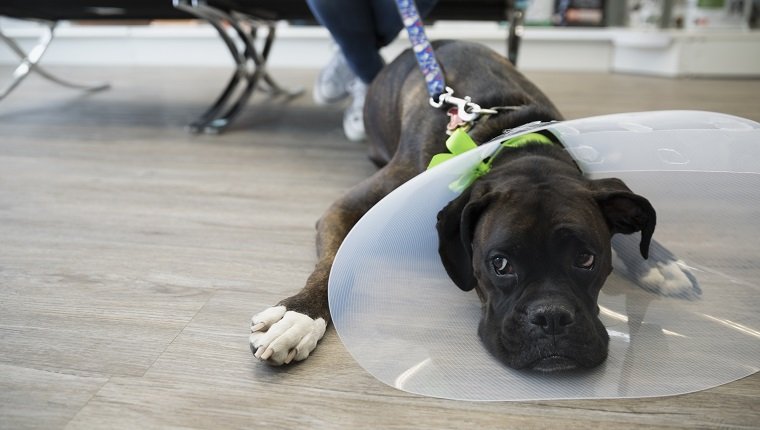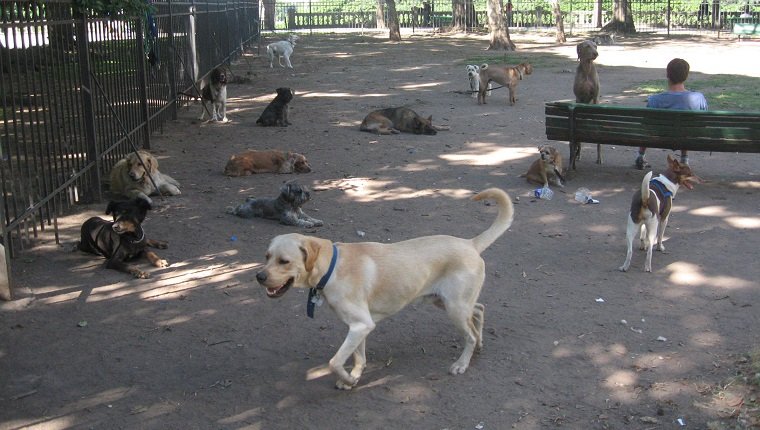Ringworm in dogs, also known as dermatophytosis, is a parasitic fungal infection of the skin, hair, or nails. While the infection is superficial and not life-threatening, it’s important to begin treatment right away, as the fungus is highly contagious and can spread between canines, other animals, and humans.
Despite its name, ringworm is not actually a worm at all. The “ring” in ringworm refers to the round, red lesions that often appear with the infection, but these lesions are not always shaped like a ring.
Any contact with the fungus can lead to infection. If you see the signs of ringworm in your dog, you must consult your veterinarian. They’ll form a treatment plan that will probably include topical medication to fight the infection.
Here’s what you should know about the symptoms, causes, and treatments for ringworm in dogs.
Symptoms Of Ringworm In Dogs

The symptoms of ringworm in dogs typically appear on the skin and hair at the site of the infection. If you see these signs, then contact your veterinarian right away. While ringworm isn’t life-threatening, it will need to be treated quickly because it is so contagious.
Here are a few symptoms associated with ringworm.
- Flaking of the skin that looks similar to dandruff
- Hair loss
- Dry or brittle hair
- Rings of inflamed skin or small, round lesions
- Oozing from lesions
- Red or darkened skin
- Inflammation around the claws
- Roughness or brittleness in the claws
Causes Of Ringworm In Dogs

Ringworm in dogs results from contact with the fungus, but there are many ways a dog might be exposed to it. The fungus can stay dormant for up to 18 months, which makes it difficult to avoid and get rid of.
Dogs with compromised immune systems are at higher risk for infection. Some dogs show no symptoms at all, but can still be carriers of the disease and infect other dogs.
Places where there are several animals close together, such as kennels or shelters, make the spread of ringworm more likely. Ticks or other animals may carry the fungus, as well.
Contact with bedding, dishes, or any material from an infected animal will also spread the infection. Rugs, carpets, furniture, or anywhere that dog hair can collect may harbor ringworm, which is why it is important to thoroughly clean any area that an infected dog has touched.
Treatment For Ringworm In Dogs

Treatment for ringworm in dogs isn’t just about curing the infection. It also involves clearing the fungus from dogs’ living spaces and environments.
Your veterinarian will help come up with a plan to treat the disease and advise you on how to sterilize your home so that ringworm doesn’t return or spread to you and other pets.
Topical ointments are often prescribed to clear up the infection. These can be used along with medicated shampoo in cases of severe infection. Your dog may have to wear an Elizabethan collar to prevent them from licking the affected area and ingesting the ointment.
Some antifungal medications can be given orally, as well. Follow your veterinarians instructions closely and do not stop the medicine regimen until your vet says to do so, even if it looks like the infection has cleared up.
While your dog is infected, you may want to keep them somewhat quarantined in a room or area of your home that is easy to clean. Dogs can remain contagious for about three weeks, and the microscopic spores that cling to your dog’s hair can spread easily.
You will need to thoroughly clean your home and anywhere that your dog’s hair may have shed. Hair is easier to clean on hardwood or tile floors, so you should consider keeping your dog in a room that is free of rugs or carpet.
Vacuum frequently and make sure all furniture is cleaned. Using washable furniture covers can help. Remember that fungal spores can remain dormant for 18 months, so clean diligently.
Has your dog ever had ringworm? How did you treat it? Let us know in the comments below!









